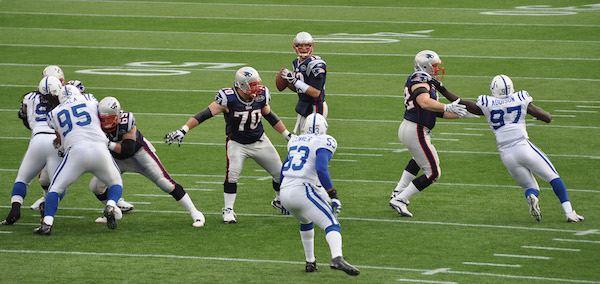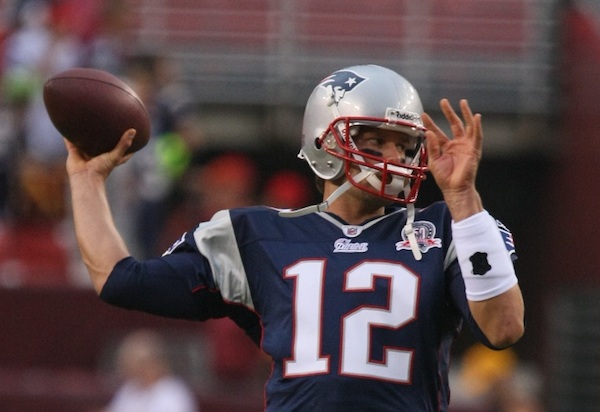Dear Sports Fan,
Can you explain the big story that’s going around right now about the New England Patriots intentionally deflating footballs? What the what?
Adam
Dear Adam,
When I was a kid, my Dad taught me a joke about a lawsuit between two Russian neighbors. We’ll call them Laskutin Kvetoslav Konstantinovich and Ungern Zinoviy Georgiy (this random Russian name generation website is insane!) Anyway, Laskutin sues Ungern, claiming that Ungern borrowed a cooking pot from him and returned it with a big hole in the bottom of the pot. The case goes to trial. Ungern, who happens to be a lawyer, represents himself and wins the case after arguing that the hole was in the pot when he borrowed it, the pot was in perfect condition when he returned it, and he never even borrowed the pot!
The joke (did you laugh?) is meant to poke fun at the insanity of a legal system that, by only requiring the creation of doubt about the truth to acquit a defendant, encourages lawyers to use many different arguments, even if they contradict themselves. The biggest story in football today is a scandal being variously called, “deflate-gate” and “ball-ghazi”. Even if you don’t follow football, you’ve probably heard or seen something about this. I’ll give a quick summary of the story and then explain why it reminds me so much of my Dad’s joke.
During the New England Patriots 45-7 win over the Indianapolis Colts in the AFC Championship game, Colts linebacker D’Quell Jackson intercepted a pass from Patriots quarterback Tom Brady. After running to his own sidelines with the ball, Jackson handed the ball to a Colts equipment manager who noticed that the ball seemed under-inflated. He mentioned it to someone who mentioned it to someone else until it became a thing. What we now believe to be true, based on a leak from the NFL itself, as reported by Chris Mortensen on ESPN, is that 11 of the 12 balls the Patriots used on offense were significantly under-inflated.
That may not seem like much, but that’s basically the whole story. The NFL is investigating the incident and will surely be heard from sometime before the Super Bowl. In the meantime, sports fans and the sports media are in full-on freak out mode. Some are saying that this is the biggest cheating scandal since the last time the Patriots were punished for cheating in the 2007 Spygate scandal and that the Patriots should be both ashamed of themselves and punished by the league. Others are saying that this is totally normal and not a big deal. Shockingly, part of what’s helping people decide which side to be on is whether they root for the Patriots or not. In any event, partially because it’s an interesting story and partially because the two-week gap before the Super Bowl is hard to fill with stories, this has become the biggest thing in the sports world right now.
How could this happen? What happens to football before and during a game?
A reasonable person might assume that the NFL itself would be in charge of providing footballs for each game and that their officials would be in charge of handling the balls to ensure they are not tampered with. That’s not true. Like many things about football, the rules that govern the football used in a game are Byzantine and bizarre. Even in articles from reputable sources, there are discrepancies about how it’s supposed to work, but as far as I can gather, this is basically what is supposed to happen:
- Before the game, each team brings 12 (24 if there is bad weather predicted) balls to the refs. These balls don’t have to be new, they can be handled, scuffed up, or conditioned by the teams.
- 135 minutes (why? who knows?) before the game, the refs check the balls to make sure they are inflated properly — between 12.5 and 13.5 pounds per square inch. This can be done with either a pressure gauge or a scale or both. If the balls are off, the refs inflate them or deflate them themselves. When they are good, the refs initial them with a sharpie before giving them back to the teams’ equipment managers or ball-boys. Read a behind-the-scenes account of this here.
- During the game, each team uses their own twelve (or 24) balls when they are on offense.
- Since 1999, the league itself has provided special kicking balls to be used by both teams’ kickers and punters. These balls, sometimes called ‘K’ balls, are brand new but each team is given 45 minutes under supervision of a referee to mess with the kicking balls before the game.
As you can tell, the rules seem to be written with the intention of allowing teams (primarily quarterbacks, since they handle the ball the most during the game) to customize the balls they are going to use on offense within reason. Otherwise, why wouldn’t the league simply provide brand new balls for each game and keep them under supervision throughout the game?
Okay, now tell us why this is like that joke
Imagine that instead of two Russians, it’s the Patriots who are in court and need to come up with a defense. So far, the Patriots have not said much about this issue other than that they will cooperate with the league investigation. If they were to defend themselves and they had Ungern as their lawyer, he might argue that tampering with the balls is totally normal and everyone does it, that sure, they deflated the balls but no one really knows whether deflating the balls would provide an advantage, and that you can’t prove they did anything to the balls anyway!
Everyone does it
In most arenas, this is not the best defense against cheating but in sports it seems to fare a little bit better. Sports is a culture where rule-breaking is acceptable up to a certain point. You’ll often hear football announcers say that there is “holding on every play.” It’s true, if referees decided to apply the strict letter of the law, they could call a penalty on every play. What ends up happening is that in every game, there is a level of holding that is accepted and what really gets called is holding more blatant than normal. No one thinks a player that holds is cheating. The same thing might be true about doctoring footballs but until this scandal, it wasn’t widely known. Since this scandal has broken out, we’ve heard reports that quarterback Brad Johnson paid $7,500 before the Super Bowl in 2003 to scuff up the balls to his liking. Deadspin dug up some footage of announcers discussing a conversation they had with Green Bay quarterback Aaron Rodgers who told them that he likes to inflate his teams footballs past the legal limit and hope that the referees don’t catch him. If tampering with footballs is normal (and the NFL has certainly created rules and an enforcement plan with enough wiggle room to allow for this) than the worst we could say about the Patriots is that they tampered more blatantly than normal and got caught.
Deflating the balls didn’t help
Everyone in football seems to have strongly held beliefs about the condition of the football but what’s the truth? Does over-inflating the ball make it fly faster and straighter, easier to hold on to, and better to catch? Aaron Rodgers thinks so. Or is it under-inflating the ball that makes all of those things better? Tom Brady certainly thinks that is true. In 2011 he was quoted as saying he loved when teammate Rob Gronkowski spikes the ball, “because I like the deflated ball. But I feel bad for that football, because he puts everything he can into those spikes.” But what the heck does he know? In a 2006 New York Times article by Judy Battista, a quarterback who played with Brady mentions that Brady likes his balls, “so broken in that it looked as if he had been using them since junior high school” and that Brady insists on rubbing the balls down before using them to rid them of a substance that coats the balls when they are made. Brady was quotes as saying, “The preservative on the football, when you get it off, it’s easier to get a grip.” This is despite the fact that the maker of the balls is quoted as saying in that same article that that substance makes the balls “about as sticky as a Post-it note, and that improves the grip.”
Meanwhile, in the universe of kickers, there seems to be a similar disagreement. A Business Insider article by Tony Manfred reports that “In 1999, the NFL switched to special “K balls” for special teams plays because they were paranoid that players were manipulating regular balls to make them fly higher and straighter” and quotes from a Sports Illustrated article (now lost from posterity because they basically destroyed their online archive) saying that “New footballs are hard, unforgiving, smallish (with a correspondingly small sweet spot) and coated with a film that makes them slippery. They don’t travel as far as game-worn balls, and they can’t be “guided” as accurately as roundish, softer balls. When you see a kicker squeeze a ball, it’s because he wants to soften it and make it rounder.” But wait, but wait, now that the Patriots are accused of being cheaters, Jason La Canfora writes for CBS in this article that sources of his from the Baltimore Ravens are complaining that in their game against the Patriots, “Baltimore’s kicking and punting units were not getting their normal depth and distance, and some believed the balls they were using may have been deflated.”
So, which is it? Is a soft ball better or a hard ball? Is there a scientist in the house?
The league can’t prove anything
It’s going to be difficult for the NFL to prove wrong-doing in this case. Oh, the circumstantial evidence is pretty strong that someone did something to those balls on behalf of the Patriots but how and when, unless they were caught on video doing it, is going to be tough to prove. Were the balls under-inflated to begin with and the refs simply didn’t notice or didn’t care until the Colts complained? Were the balls properly inflated, approved, and then later doctored by a member of the Patriots? If so, who was it? Did any of the key players or coaches ask for this to happen or did a ball-boy or equipment manager do it himself?
At best, the league may be able to prove that someone tampered with the balls but not exactly who. In that case, I think that the NFL should tread somewhat lightly on this issue. It would be tough to come down hard on the Patriots, arguing that the lack of institutional control needed to prevent this type of tampering is itself worthy of serious punishment. After all, it’s still widely thought that the NFL was seriously negligent at best and totally corrupt at worst in its handling of the Ray Rice domestic abuse case in the past year.
Short-term, I can’t imagine that this story will affect the Super Bowl. The game between the Colts and Patriots will not be replayed, nor will the Patriots be barred from playing the Super Bowl. Coach Bill Belichick may be suspended but my guess is that the suspension would start after the Super Bowl is over. There will definitely be fines or draft picks that get taken away, but not organization changing ones. The rules governing balls will almost definitely be changed to prevent this from happening again and football will keep flying along, under, over, or properly inflated.
Thanks for reading,
Ezra Fischer
p.s. In case you’re looking for humor about deflate-gate that actually makes you laugh, take a look at this or this.


